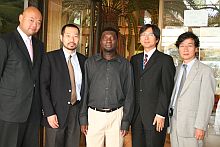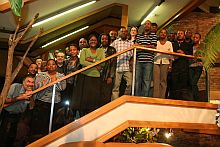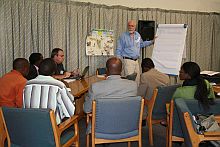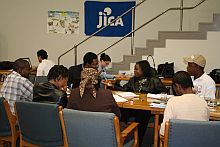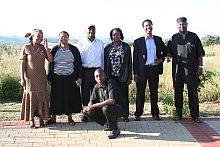In search of climate change adaptation solutions for Southern Africa
|
In March this year, 28 delegates representing six Southern African countries convened in Muldersdrift near Johannesburg for a pioneering workshop to investigate the status of current climate change adaptation research in the region.
The workshop was spearheaded by the South African office of the Japan International Cooperation Agency (JICA-SA), in collaboration with SAEON and the Africa Centre for Climate and Earth Systems Science (ACCESS).
The workshop was intended to be a pilot for further workshops in the region, and served as a yardstick of the status and nature of adaptation research programmes, areas of expertise, existing facilities and unique challenges in each of the countries – Lesotho, Mozambique, Namibia, South Africa, Swaziland and Zimbabwe.
The workshop was probably the first of its kind to draw together scientists, science managers and science writers in a single event to to brainstorm adaptation solutions for the sustained wellbeing of the people in our region.
Delegates were hand-picked to ensure that the right people attended the workshop to lay the foundations for further regional debate, collaboration and the implementation of successful adaptation measures throughout the region.
The programme was facilitated by Laurie Barwell of the Council for Scientific and Industrial Research’s (CSIR) Unit for Natural Resources and the Environment.
Current status of climate change adaptation research
At a cocktail function on the first evening, delegates were welcomed by Dr Amani Saidi of SAEON, who gave a presentation to introduce them to SAEON and its crucial role in long-term environmental observation.
Day one of the workshop focused on gaining a deeper understanding of the current status of research and challenges in the region.
The proceedings started with presentations by Naoyuki Nemoto and Iwao Sakurai of JICA-SA, Yohei Miyauchi, Special Researcher for Economic Affairs of the Embassy of Japan and Mamoru Iida, Advisor to RICAD (Regional Initiative for Capacity Development - technical cooperation project between JICA and the SA Department of Science and Technology) and the driving force behind the workshop.
The presentations introduced delegates to JICA and its activities in the region as well as the Japanese Government’s policy for African Development and Climate Change cooperation.
The delegates were then given an opportunity to finalise their country presentations in a standardised format, which provided an excellent basis for comparison between the countries.
In the day’s concluding remarks both Laurie and Mr Iida pronounced themselves well satisfied with the high standard reflected by the country presentations and the progress made in gaining a deeper understanding of the challenges facing each of the countries and the expertise residing in them.
Mapping the way forward
Delegates arrived well prepared for the workshop which took up the greater part of day two. They were split up into three separate task teams to brainstorm the way forward in adaptation research.
Each task team leader then presented the findings, including the media group which had their own breakaway session to discuss best practices in communicating the results of climate change adaptation research to relevant audiences, including the general public.
An analysis of the findings revealed current research gaps, clear priorities and opportunities for collaboration throughout the region. Special emphasis was placed on the importance of short-term and long-term observation to improve prediction models and timeously inform early-warning systems.
Other key issues noted during the Workshop include the need for data downscaling and production of regional maps, the development of a regional /international Masters’ course on Earth systems science, the promotion of data access and sharing via existing networks such as SAEON and the Environmental Long-Term Observatories of southern Africa (ELTOSA), increased and improved science communication of climate change, and the appointment of a task team to further develop a proposal around the development of a large, integrated regional research programme.
Who’s your daddy?
As a token of JICA-SA’s appreciation for the sterling contribution by the delegates, they were treated to a visit to Maropeng, the official visitor centre for the Cradle of Humankind World Heritage Site. The word “maropeng” means returning to the place of our origins, and delegates were taken on a journey back in time when humankind’s earliest ancestors roamed this area.
Next steps
According to Mr Iida, the workshop served as a valuable baseline for further interaction, investigation, sharing of best practices and collaboration. A second, more extensive workshop is planned in the 2009 fiscal year to build on the firm foundation laid during the first workshop.
Workshop proceedings
The workshop proceedings - which include a regional synthesis of countries summarising the current situation in each country as well as for the region - will be available in May.
SAEON eNews readers can order a printed copy of the proceedings from Mitzi du Plessis
.................................................................................................................................
JICA – sharing knowledge for a more prosperous future
The mandate of the Japan International Cooperation Agency (JICA) is to implement technical cooperation as one of the components of the Government of Japan’s official development assistance (ODA) in developing countries across the globe, many located in Africa.
JICA has almost 100 offices located in developing countries across the world, one such office being the JICA South Africa Office.
JICA regards itself as a bridge between the people of Japan and developing countries, to advance international cooperation through the sharing of knowledge and experience, and to work towards building a more peaceful and prosperous world.
JICA utilises various programmes to implement its technical cooperation, including training programmes, capacity building via visits to developing countries by relevant experts (Japanese and other nationalities), Japanese volunteer dispatch, development studies and supply of equipment.
Within the Southern Africa region, governments have started developing policies and strategies such as the National Adaptation Plan of Action (NAPA). Human capacity building and information sharing through a scientific approach have been identified as critical needs by many Southern African countries.
Similarly, the Japanese ODA strategy focuses on some important aspects in the adaptation domain, including the strengthening of adaptability at society level, assessment of needs based on scientific knowledge and information, and the enhancement of expertise in the adaptation domain.
The combination of these shared agendas resulted in the Regional Workshop on Climate Change Adaptation Research Activities and Needs as described above.


